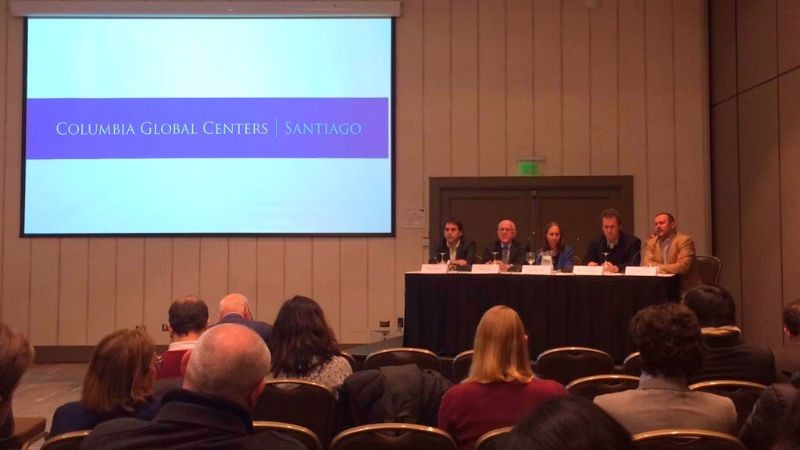Seminar on Equitable and Sustainable Public Urban Transportation

The Santiago Center, in association with Chile’s Center for Sustainable Urban Development (CEDEUS), organized a seminar in late June entitled “Promoting Equality through Sustainable Public Transportation."
The panel discussion featured Elliot Sclarand Jacqueline Klopp, Director and researcher, respectively, of Columbia’s Earth Institute Center for Urban Transportation; Juan Carlos Muñoz, Director of the Bus Rapid Transit of Excellence and of CEDEUS; and Pablo Schwarz, deputy manager for Research at Santiago’s Subway System (Metro S.A.)
Elliot Sclar opened the session with an overview of the relationship between equality and transportation. He began by expressing a critical view of certain paradigms that favor mobility over access in transport public policies. In his opinion, this paradigm comes from a focus on productivity and movement speed, rather than one that considers more complex aspects revolving around life experience in the cities. One of the key messages of his presentation --that set the tone for the rest of the interventions-- was that the policies of transport and land use are two sides of the same coin. According to Sclar, these cannot be separated from each other and, thus, public policy that considers public transport as a development tool should equally consider its relationship with land use policies. Less dense cities with little diversity in land use need transport facilities that allow people to move large distances as fast as possible, while polycentric cities require different means of transport.
Jacqueline Klopp recounted her experience as a researcher in both Nairobi and New York. She stressed the need to develop metrics to measure inequality in access to social and economic activities within the framework of the United Nations’ Sustainable Development Goals. In the case of New York, Klopp showed statistics depicting the time it takes to reach certain job locations depending on the level of remuneration and origin of workers. The data shows extreme inequality in access: People in poorer neighborhoods must travel much greater distances to access high-income jobs than people from richer neighborhoods. On the other hand, she commented on the development of new urban roads in Nairobi, which are based on outmoded models that favor the use of the car exclusively without consideration for the infrastructure for buses and pedestrians (imitating the development of large US cities in 1950s).
Juan Carlos Muñoz gave a description of the urban development of Santiago, with a focus on the city’s extreme inequality and segregation. He showed how the employment opportunities, historically located in the center of the capital, have been displaced towards the sectors in which people of higher incomes live. These areas are also more difficult to access for low-income people, which is a major challenge for the city's transportation policies. Likewise, Muñoz showed the inequality in public transport infrastructure. High income boroughs, where public transport users work but do not vote, have the worst public transportation logistics and impose restrictions to bus movements. Finally, in general terms, he took up Sclar's ideas, pointing out the need for an integrated policy on land transport and land use, criticizing the fragmented political-administrative structure of the city and the lack of political will to transform Santiago into a place that promotes equality.
Daniel Schwarz discussed of Metro in the public transportation system of the city of Santiago. In particular, he stressed how the projected new lines plus the extensions of existing ones will drastically reduce travel times between low-income areas and places where jobs are located. This plan responds to the new reality of expansion of residential and commercial areas of the city, he said. Schwarz also emphasized the importance of a comprehensive city planning process.
There was a high degree of consistency in the four presentations, mainly centered in the need to consider the policy of transport and land use jointly in order to address the growing inequality that afflicts Santiago and other large cities in the world. In view of the panelists, market forces have not been able to deliver solutions to access social and economic opportunities, a fundamental public good delivered by cities. In the case of Santiago, these forces have favored a strong process of segregation and development of urban roads that, in the long run, do not point towards the integration and/or sustainability. In order to move towards more humane and sustainable cities, a comprehensive planning process is required to consider all possible modes of transport (Metro, Transantiago, Bicycles, Taxis, Automobiles, etc.), a plan which requires political will and unity.
You can read Elliot Sclar´s interview in La Segunda, here.